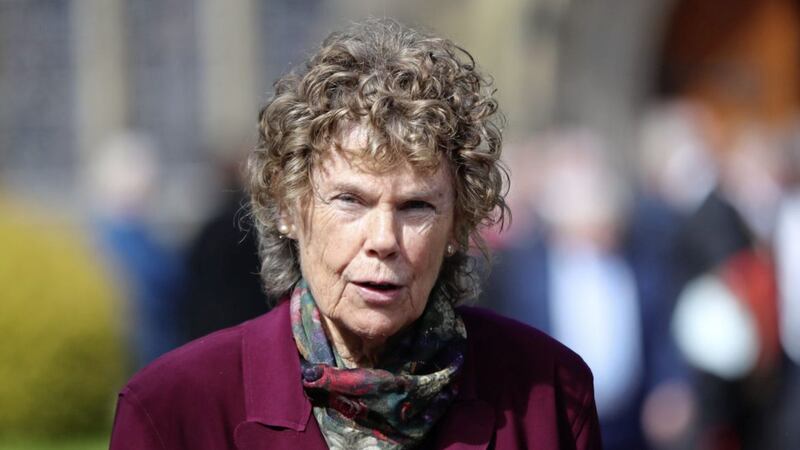Northern Ireland continued through the first year of its post-centenary existence this month with the largest unionist party repeating and then pressing pause (not eject) on the threat it had already made ad nauseum over recent times to bring the political institutions crashing down.
Jeffrey Donaldson’s big speech to the Tory backbench 1922 Committee last week was overshadowed by events elsewhere in London as Boris Johnson’s reputation took another pounding, but the DUP leader’s claim that the protocol was “a bad deal for the UK” prompted the obvious and accurate riposte from the SDLP’s Matthew O’Toole that it was Brexit itself that delivered the bad deal for Britain.
That sober assessment was underscored by a presentation to the assembly economy committee by a senior Stormont civil servant warning that the loss of £100 million of EU funding over the next three years could result in a reduction in university places and delaying the rollout of the much vaunted city deals.
At the time of writing, every unionist leader (even liberal Doug) still refuse to commit to continuing in government in the event of a nationalist being democratically elected to the post of first minister. The most likely election outcome, with Sinn Féin emerging the largest party, may yet result in a prolonged unionist boycott of the political institutions potentially resulting in a wintry return to the polling booths later this year.
For those who have forgotten, the Good Friday Agreement continues to be contravened by the DUP through the boycott of North-South Ministerial meetings in spite of a High Court judge finding the party’s ministers’ actions to be an unlawful breach of the pledge of office.
All unionist parties continue to oppose an Irish Language Act for this part of Ireland first promised by a British government sixteen years ago, with the DUP at Belfast City Council level - courtesy of Councillor Brian Kingston - last week arguing that words in Irish appearing on a sign in a leisure centre would have “a detrimental impact” on Protestants.
As an elected representative for the Court area of north-west Belfast, the two leisure centres serving Kingston’s constituents would be Ballysillan (‘townland of the willows’) and Shankill (‘old church’), both words derived from Irish, illustrating how irony would appear not to be Brian’s strong point.
Meanwhile, the most vociferous daily pro-Union local newspaper continues to heavily promote the views of the loyal-est of loyal fringes, seemingly blind to the reality that the propagation of these embittered voices with their narrow agendas serves only to undermine their shared cause.
The shrill sentiments of Baroness Hoey were laid bare in her published diatribe lamenting the rise of a middle class populated by the wrong type of Roman Catholics, now well above and beyond their station with little intention of keeping heads bowed Larne-style. They’ve even got constitutional notions of their own complete with the temerity to express them in public! Where did it all go wrong?
In a radio interview discussing Hoey’s comments, notable DUP veteran Jim Wells defended the Baroness whilst casually speaking about monitoring graduation photographs for Queen’s Law students as if this remotely resembled conduct becoming of a normal person.
There is a straight line to be drawn from Kate Hoey’s and Jim Wells’ utterances on nationalist professionals to unionist leaders contacting Queen's University to complain about Colin Harvey and refusing to state if they’d work in an executive led by a nationalist first minister.
Long ago, many unionists began to sense that their Ulster didn’t feel right anymore. Their world is one in which a series of last stands continue to be made amidst doomsday predictions. It remains now, as it has ever been, that the most passionate supporters of the 'wee country' (which is definitely not ours) are those who are seemingly intent on proving beyond any doubt that its continued existence is incompatible with a shared, equal and even prosperous future.
The latest identity spat to occupy the broadcast waves broke out after a unionist request for a tree to be planted at Stormont to mark the Queen’s platinum jubilee was turned down by the Sinn Féin finance minister, who chose to keep his own counsel instead of seizing the opportunity to both reach out and challenge unionists by backing the move on the condition that the statues of Carson and Craig finally get deserving partners (I’m throwing my support behind Casement and Markievicz.)
Northern Sinn Féin remains a party stuck in transition and an associated complacency which has blunted its sharpness. A McGuinness-led Sinn Féin would be poised to romp home at the polls next May. No such certainty prevails at the moment in spite of the painfully obvious woes and divisions plaguing unionism. 2022 is set to be an interesting year.









